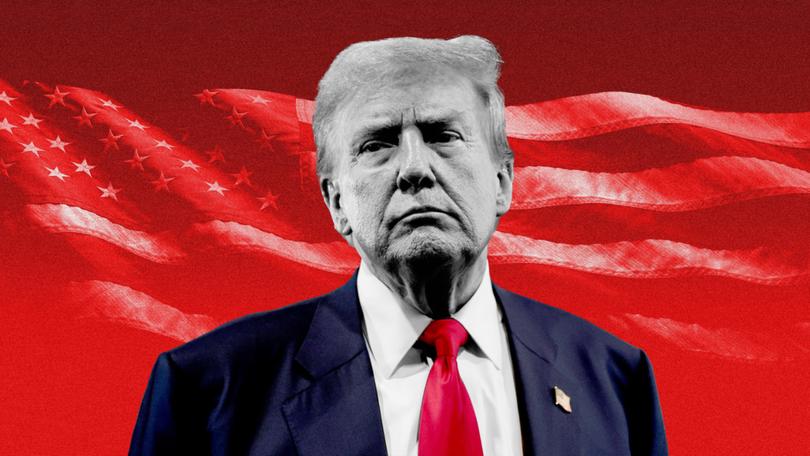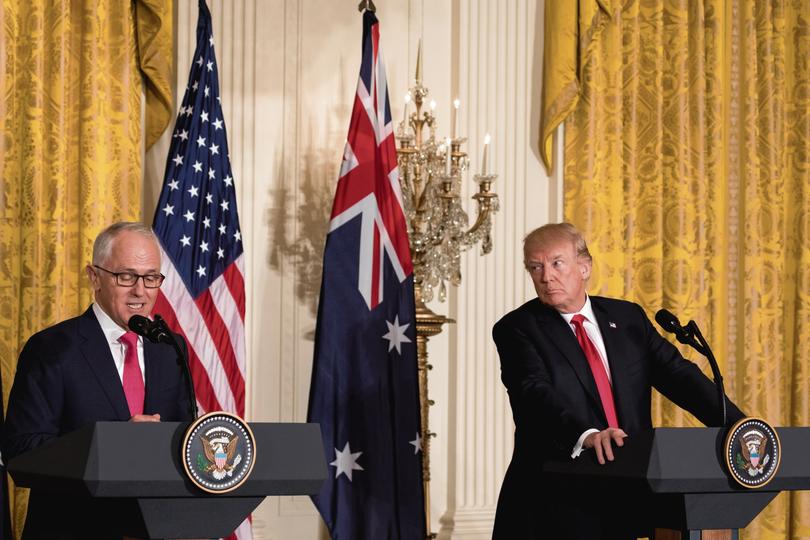Australia-US relationship will be less stable under Donald Trump, says former Ambassador Jeffrey Bleich
The United States’ former ambassador to Australia Jeffrey Bleich has given a bleak assessment of what a Trump return to the White House will mean for us.

The United States’ former Ambassador to Australia Jeffrey Bleich has warned that the bilateral relationship will be less stable if Donald Trump is President again.
The warning came as the US vice-presidential candidates, Democrat Tim Walz and Republican JD Vance finalised their preparations for their showdown in CBS’ debate scheduled for Wednesday.
Pollster Nate Silver’s poll of polls shows Democrat nominee and current Vice President Kamala Harris ahead nationally at 49.2 per cent compared to 46 per cent for Republican nominee and former president Donald Trump.
Sign up to The Nightly's newsletters.
Get the first look at the digital newspaper, curated daily stories and breaking headlines delivered to your inbox.
By continuing you agree to our Terms and Privacy Policy.But because US elections are determined by the Electoral College, the result will be determined by a handful of swing states, including Pennsylvania where Ms Harris has regained her lead.
However, in the state of Georgia, Mr Trump is narrowly leading Ms Harris in the polls.
With early voting already underway, Mr Bleich is one of 700 former military and national security officials who signed an open and bipartisan letter endorsing current Vice-President Kamala Harris for the Oval Office.
The letter, published by National Security Leaders for America, and addressed “To the American People,” said the election was a “choice between serious leadership and vengeful impulsiveness” and “between democracy and authoritarianism.”
“We do not make such an assessment lightly. We are trained to make sober, rational decisions,” the group of former secretaries, retired generals, admirals, ambassadors and diplomats said.
They said Mr Trump had “publicly and privately excoriated” the leaders of the US’ most steadfast allies, including the United Kingdom, Israel, Australia, Canada, and Germany, whilst heaping praise on dictators and terrorist leaders.
Speaking exclusively to The Nightly, Mr Bleich said he had seen first-hand how Mr Trump’s approach to foreign policy was damaging for the United States’ friends and enabling for its rivals and enemies.
“One of the challenges of being an ally when Donald Trump is president is that he doesn’t draw a distinction between close allies and partners and other countries,” he said in a phone interview from Australia, where he visits about five times a year as part of his ongoing work to further bilateral ties.
“He’s very transactional in his concept of foreign affairs.
“I think that because the United States and Australia’s common interests are so closely aligned, I would hope that we continue without any turbulence in that relationship.
“On the other hand, one of my concerns with Donald Trump is that he approaches alliances in a way that creates concerns, fear, and anxiety among allies and may cause them to think about what their alternatives are which is not a good way to maintain strong partnerships.”

Australia fared relatively well under the Trump Administration, thanks to a solid relationship between President Trump and former prime minister Malcolm Turnbull and the deep links into Mr Trump’s White House that the then-ambassador Joe Hockey forged.
Mr Turnbull managed to persuade Mr Trump to honour an Obama-era agreement to accept Australia’s unwanted refugees who had travelled to the country by boat and Australia avoided being smacked with steel tariffs that were imposed on the European Union.
Mr Bleich said that Australia might still fare relatively well again under a second Trump Administration, but that the relationship would not be in any question if Kamala Harris won in November.
“I would hope that if he were elected and that if he had the right leaders around, that we would make the right choices with Australia,” he said.
“I’m just much more confident that we would make the right choices and that we would build upon them with Kamala Harris as President.”
“The relationship would be much more stable and that improves both of our security.”
Mr Bleich said one concrete example where Mr Trump’s transactional approach cost the US and its friends, was his decision to withdraw from the Trans-Pacific Partnership.
The TPP was an Obama initiative that proposed creating a massive trading bloc between Australia, Brunei, Canada, Chile, Japan, Malaysia, Mexico, New Zealand, Peru, Singapore and Vietnam.
Trump withdrew from it in 2017 and it was left to Australia and Japan to revive the deal, which has been expanded to include the United Kingdom following its departure from the European Union.
But the salvaged deal is lacklustre compared to the promise it offered to its participants when it included access to the world’s largest economy.
The United States is notoriously difficult to strike trade agreements with and has grown more protectionist under the Democrats, with President Joe Biden’s Inflation Reduction and Chips Acts aimed at driving American high-tech manufacturing.
Mr Bleich said Mr Trump’s decision to deprive much of the Asia-Pacific region of the chance to trade with the United States was a victory for Beijing.
“He gave away something which China truly did not want to have happen and he did it for nothing,” he said.
“He asked for nothing in return from China.
“That’s just poor statecraft and poor diplomacy.”
Mr Bleich was a popular figure in Canberra when he served as US Ambassador between 2009 and 2013.
He was an Obama Administration appointee but strongly rejected any suggestion that he was speaking out against Mr Trump because of politics.
“I’ve served Democrats and Republicans alike, I served as Chair of the Fulbright Board when Trump was President, this is not about politics, this is not about partisanship,” he said.
“This is about the principles of national security, for me national security is critical.”
He pointed to the litany of former security officials, including former national security advisers HR. McMaster and John Bolton, who have strongly criticised Mr Trump’s handling of national security and foreign policy based on their experiences working in his White House.
“These are serious people who had an up-close look at the Trump Presidency and came away saying they could not serve with him again and that he was unfit for the role,” he said.
“These are reflections of very serious people who believed in service to Donald Trump as President, who came away disillusioned and deeply concerned about him as Commander-in-Chief.”

